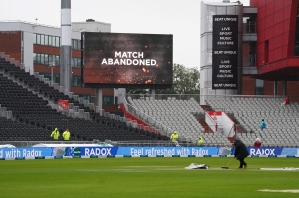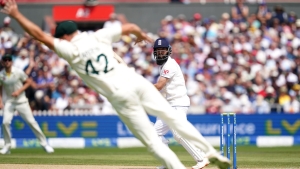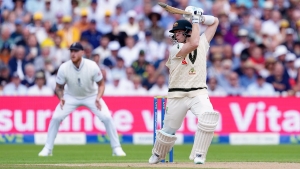Zak Crawley produced an instant Ashes classic as England seized control of the must-win fourth Test with a barnstorming display on day two at Emirates Old Trafford.
Crawley crashed and smashed his way to 189 runs from 182 balls as the hosts bullied Australia with a heavy dose of ‘Bazball’ bravado.
After bowling the tourists out for 317 with two early wickets, England wiped out the deficit in just 55 overs and finished 67 ahead on 384 for four.
The speed of their assault was motivated partially by the threat of bad weather over the weekend and Crawley was the ideal man to lead the way. He unloaded 21 fours and three sixes, repaying the rock-solid faith Ben Stokes and Brendon McCullum have shown him.
The 25-year-old’s inconsistency has attracted criticism and he arrived at the crease with an underpowered Test average of 28.65. But he has a maverick quality that appeals to the current regime and could not have picked a better stage to spread his wings with a fourth ton.
At 2-1 down with two to play England have no option but to win this game, regardless of the coming rain, and Crawley has given them every chance.
Moeen Ali (54) and Joe Root (84) offered lively support, with Harry Brook and Stokes unbeaten overnight.
England were into their work swiftly, James Anderson removing Pat Cummins with the first ball of the morning and Chris Woakes completing a well-deserved five-for to end the innings.
Crawley started as he meant to go on, brushing the first ball of the innings off his hip for four, and refused to let Ben Duckett’s third-over dismissal knock him off course.
He weathered a couple of early scares, edging inches in front of slip on 12 and given out lbw on 20 before successfully calling for DRS, but held his nerve to reach the lunch break intact.
Moeen’s promotion to number three came with low expectations – not least from himself – but he proved a perfect ally, sharing the burden with a flurry of four boundaries in eight deliveries.
From a promising foundation of 61 for one, England proceeded to play two outrageous hours of adrenaline-fuelled cricket in the afternoon session. In the space of 25 overs they scored 178 runs, with a run-rate of 7.12 that would not have been unacceptable in a T20.
Crawley was a conundrum Australia simply could not crack. A couple of inside edges skated dangerously close to his stumps and more than one thick outside edge climbed over the cordon, but even his errors raced through to the ropes.
When he did find his timing, he looked imperious. He showed Cameron Green the full face of his bat as he stroked elegantly down the ground, walked across his stumps to open up fine-leg and drove through cover with style.
He even made sure to hammer home Australia’s folly in leaving out a specialist spinner. When part-timer Travis Head took a turn, Crawley reverse swept his first ball for four and then stooped to launch the follow-up into the stands.
Moeen fell for 54, well caught at midwicket by Usman Khawaja to give Mitchell Starc a second success, but a partnership of 121 represented a job well done.
Crawley and Root ensured the momentum did not go with him, the latter immediately negating Australia short-ball tactics with some expertly judged hooks.
A delicious cover drive took Crawley within one blow his hundred and he got there off just 93 balls with a lobbed cut shot that is unlikely to be found in any coaching manual. The crowd roared him on, but the reaction on the balcony, from team-mates who have repeatedly rallied to his defence in the lean times, was even more telling.
Root ensured the fun kept coming, dipping into his bag of tricks to reverse ramp Mitchell Marsh over for six. The tea interval did little to revive the away side’s flagging spirits, Cummins unable to rouse his side by word or deed.
He gave himself a four-over burst at the start of the evening and shipped 30 including back-to-back straight fours that took Crawley to 150. At one stage Cummins attempted to review an lbw appeal that had hit Root’s bat, making the signal with comic timing as the umpire signalled no-ball. When England picked up three overthrows for some sloppy backing up at the bowler’s end, it was no surprise to find the captain was the culprit.
England took the lead in fitting style, Crawley stepping inside the line and blazing Marsh high over wide long-on for six. The quickest double hundred in Ashes history was beckoning when Crawley came to an abrupt end, dragging a short ball from Green back into his stumps.
He walked off to a well-earned ovation, having restated the mercurial skills which have made him a mainstay of the Bazball era.
Root was well placed to follow him to a ton but found himself bowled by one that shot through low from Josh Hazlewood. Brook and Stokes put on a calm 33 before stumps but more fireworks are likely as England look to move things forward on day three.








































